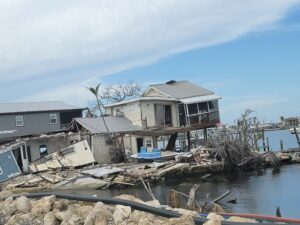Experts predict this hurricane season to be above-normal. There’s a 60% chance of this prediction being accurate, with only a 30% chance of a near-normal season, and—even smaller—a 10% chance of being below-normal. The NOAA’s Climate Prediction Center thinks there will be at least 6-10 named hurricanes, with 3-6 of them being major (categories 3, 4, or 5, with winds of 111 mph or higher).
After you have made hurricane preparation plans, it is time to consider your strategy for during and after the storm. It is also essential to know how COVID-19 will affect them. In this guide, we explain what to do during and after a hurricane to stay safe.
Follow Distancing Guidelines If You’re Taking Shelter
Have you already sought out your local shelter with plans to go there during a hurricane? Or, do you have a neighbor or loved ones planning to stay with you in your home?
Regardless of where you go (or who you host), it is crucial to maintain the CDC’s safety guidelines and take extra precautions related to COVID-19. These steps include maintaining a distance of up to six feet, wearing masks, and quarantining anyone with symptoms in a separate room.
Before the storm, know where you plan to take shelter and have alternatives. Once you have found a refuge that aligns with your wishes, come prepared with masks, hand sanitizer, and other essentials.
Seek Out Medical Attention After a Hurricane If Need Be
Medical attention can include both physical and mental illnesses. If you have an injury from a hurricane, but it is not life-threatening, clean your wounds and monitor them for signs of infection. Reach out to your primary care physician and seek out advice for the next steps. After a hurricane—and during the time of COVID-19—hospitals can quickly fill to max capacity. Because of this, try to avoid rushing to the ER if you can.
If you previously had ongoing therapy for a preexisting mental health condition, it’s essential to seek care after a hurricane (especially if symptoms worsen). Again, speak with your counselor or doctor for advice. For now, you may consider virtual sessions.
Understand What to Expect in Terms of Power, Water, and Rodents
Dealing with power outages during COVID-19, and then during hurricane season, means that it may take longer than average for power and water to be restored.
It is also essential to keep your generator outside during power outages to prevent carbon monoxide poisoning. The CDC recommends keeping them at least 20 feet away from your home, doors, and windows. If you use a generator already or have a back-up in case the power goes out, keep them stored outdoors in a safe, dry place. You’ll have already stocked up with plenty of water, batteries, and candles in the meantime.
Rodents, rats, mice, and pests may want to seek shelter or food in your home during or after a storm. It helps to know that this happens after a hurricane—but should return to ‘normal’ after a bit of time. During your preparations, you may include a few traps and insect sprays in case this occurs.
You Can Do This
As a coastal state homeowner, you have prepared for hurricanes before. The thing you have to think about now is how to be safe in the time of coronavirus, too. By having a plan for what to do during and after a hurricane, you and your family should have peace of mind. But if you still need more guidance, we can help.
Download our newly updated guide to hurricanes in 2020 where we discuss hurricane myths versus truths, preparedness, home hardiness, and much more.




